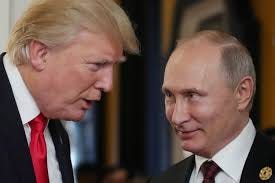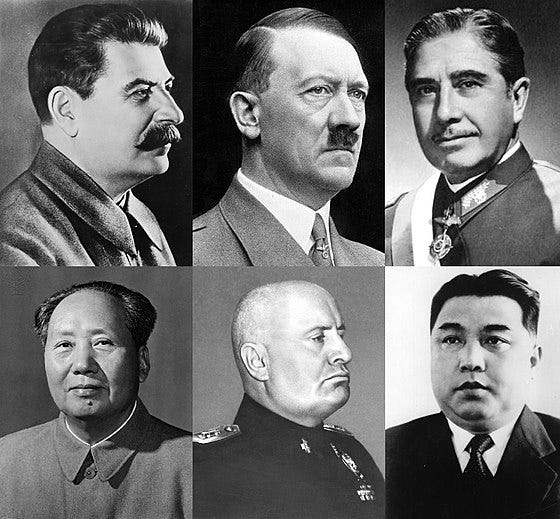Do You REALLY Want a Dictatorship?
A dictatorship is an autocratic form of government which is characterized by a leader, or a group of leaders, who hold governmental powers with few to no limitations.
A dictatorship is a government or a social situation where one person makes all the rules and decisions without input from anyone else.
Dictatorship implies absolute power — one person who takes control — of a political situation, a family, a classroom or even a camping expedition. In government, a dictatorship leaves no room for input from anyone who is not the top guy or gal. The noun comes from the late 14th century Latin word, dictare, which means to "repeat or say often." In a dictatorship, one person keeps repeating the same command: "My way or the highway."
20th-century leaders typically described as dictators, from left to right and top to bottom, include Joseph Stalin, General Secretary of the Communist Party of the Soviet Union; Adolf Hitler, Führer of Germany; Augusto Pinochet, President of Junta Government; Mao Zedong, Chairman of the Chinese Communist Party; Benito Mussolini, Duce and Prime Minister of Italy; Kim Il Sung, Supreme Leader of North Korea
Dictators often come to power in times of difficulty, such as massive unemployment, inflation, and unrest among the population. Dictators are normally backed by powerful groups, such as landowners, private company owners, bank owners and in some cases institutions like the Roman Catholic Church to put in place law and order by force. This force may be directed at the poorer parts of society, such as unemployed workers, ethnic minorities, working class areas and shanty towns.
Examples of this are the dictatorships in Latin America and the prosecution of the Jewish community in 1940s Germany.
Dictators normally need to do a number of things to put in place their dictatorships: they need to get rid of their opponents (which may be political or religious) - some are imprisoned, exiled, (sent outside their country) or killed. Dictators will then need to prohibit (or not allow) political parties that oppose their rule. They will confiscate (take away) the political parties' property or offices and such things. Dictators may suppress or persecute some religious groups or institutions. Dictators will also need to undo or close down democratic institutions such as parliament and in some cases the Congress.
Some social organizations, such as civil rights groups, human rights organizations, legal aid centers, students’ unions, teachers’ federations, trade or worker’s unions are also undone and those who persist with such activities may be imprisoned or killed. Dictators often rewrite an existing Constitution or put in place a completely new one. This makes their power constitutional (which then cannot be disputed). Dictators then maintain their rule with state terrorism, which normally involves a secret police, death squads, random or night curfew, indefinite arrest without trial, and a network of torture centers and concentration camps. Some dictatorships create a fictional (or non existent) internal (inside their country) enemy which they claim to be at war with to justify (give reason for) their use of much military violence against their people.
Democracy and Dictatorship:
Key differences
DEMOCRACY
In a democracy the leader of the party with the most votes is in control, but they still have to answer to their political party, and the voters.
In a democracy political parties represent different points of view and compete for the votes of the electorate. In a democracy political power is secured by winning a fair election.
In a democracy newspapers are free to print the truth and can criticise the government when mistakes are made or if there’s disagreement.
In a democracy there’s usually less control over the films and books people can enjoy.
In a democracy the government has less control over how people spend their time and what they believe. People are free to join clubs, political parties and other groups.
DICTATORSHIP
In a dictatorship there’s just one leader who has total control over the party and the country. Often propaganda, as well as genuine support, will paint them as the people’s hero.
In a dictatorship the government tightly controls all aspects of the state and will often ban or tightly control groups and meetings.
A dictatorship completely disregards the rights of individual citizens. The government and state will try to control all citizens through laws, police, spying and force. The government and state is the most important thing to a dictatorship.
In a dictatorship there is only one party – all opposition is destroyed and banned. Totalitarian states don’t allow opposition or elections.
The government in a dictatorship controls every element of people’s lives, including radio, cinema and newspapers.
Sociology is the study of human social behavior, human development, organizations, and institutions. In order to better understand those institutions and how humans are organized, it is important to understand how societies are governed.
https://www.youtube.com/live/rRBUREMUjVk?si=x1oz8Ulev6F2BjK2
Now, I want us to discuss and differentiate between the five main forms of power, or government, utilized in past and present societies:
Monarchy
Democracy
Oligarchy
Authoritarianism
Totalitarianism.
There are many forms of government in which people have no say in any matters, private or public. All societies are established under some form of power or government. The well-known sociologist Max Weber defined power as the ability to achieve goals even if some people in the society hold differing opinions and goals. Power takes on different forms in different societies. Let me tell you about the five basic forms of government.
Monarchy
Let's begin with monarchy. Monarchy was the most common form of government until the 19th century. Monarchy is a form of government in which a single family rules from generation to generation. The power, or sovereignty, is personified in a single individual.
There are two main types of monarchy that differ based on the level of power held by the individual or family currently in power. Absolute monarchy exists when the monarch has no or few legal limitations in political matters. Constitutional monarchies, which are more common, exist when the monarch retains a distinctive legal and ceremonial role but exercises limited or no political power.
The most familiar example of a monarchy is the constitutional monarchy that exists in the United Kingdom. A king or queen is the head of state of the U.K. as well as monarch of fifteen other independent countries. The royal family have ceremonial roles but do not make up the laws that govern the people.
Democracy
Another form of government is a democracy. Democracy is defined as a form of government in which power belongs to the people. There are two forms of democracy. One is direct democracy, in which all eligible citizens have direct participation in the decision making of the government. The second and more common form of democracy is representative democracy, in which citizens exercise their power through elected representatives. The elected representatives propose, develop, and create laws for the citizens to abide by.
The most familiar example of democracy is the representative democracy that exists here, in the United States of America. Americans elect a president and representatives of Congress.
Oligarchy
The next form of government is oligarchy. Oligarchy is a form of government in which all power resides with a few people or in a dominant class or group within the society.
These groups of people may be distinguished by royalty, wealth, education, or military control. Sometimes oligarchy governments are controlled by a few families who pass their power from one generation to the next.
Unlike monarchs, however, oligarchs do not have to be connected by bloodlines in order to inherit power. For example, one family may have power for several years, and then the power may be shifted to another group of people or another family based on their military ties or wealth. These decisions are not influenced by the people. They are influenced solely within the small group of people with whom the power is held.
The most well-known example is the former Soviet Union. Other examples of oligarchy governments are found in the countries of China, North Korea, and Venezuela.
Authoritarianism
Governments can also impose their power in forceful methods. Authoritarianism is a form of government in which the people have no participation. The characteristics of authoritarianism include absolute obedience to authority by the people and ill-defined and often changing executive power.
An example of this type of government is the country of Cuba. In Cuba, there is one leader that rules the country. Cuban citizens are not allowed freedom of speech, religion, or press. The inhabitants of the country are poor, while the leader is wealthy. Citizens of the country do not vote as the leader is already assumed.
Totalitarianism
Totalitarianism is a type of power where the leaders have unlimited and total control over people's lives. This form of government seeks to control all aspects of public and private life wherever possible. In this type of society, citizens are scared into submission by tactics such as killing, bribing, and censorship.
Unfortunately, we are familiar with totalitarianism as we have seen many examples throughout history. Hitler's Nazi rule of Germany would be an example, but there are also governments today that operate in this manner.
So you see there are many forms of government, and societies are organized and function under different rules and forms of power. Some people have more freedom, while others are scared into following the rules due to the type of leadership they have.
Summary
So, in conclusion, a monarchy is a form of government ruled by a single family, and the power resides in one individual, like a king or queen. Absolute monarchy exists when the family has a lot of power and say in the political matters of the society, whereas constitutional monarchies are more ceremonial in their roles.
A democracy is a form of government where the power belongs to the people. The people either exercise their power by voting for representatives, referred to as representative democracy, or the citizens have direct participation in the decision- and rule-making process, referred to as direct democracy.
An oligarchy is a form of government in which all power resides with a few people. These people usually inherit power due to their wealth, status, or education.
Authoritarianism is a form of government in which the people have zero participation. The citizens in these societies must adhere to the rules of the leader with absolute obedience. The power often changes and is ill-defined.
Example: The People's Republic of China, a single-party state ruled by the Communist Party of China, is widely considered to be an authoritarian government.
Finally, totalitarianism is a form of government in which the leaders have unlimited and total control over people's lives. Citizens have no privacy, and scare tactics are used to force people into obedience.
Example: Today, North Korea is ruled by a totalitarian government.
********************************************
https://catalogue.nla.gov.au/catalog/3873178
https://manorlakesp12.vic.edu.au/wp-content/uploads/2020/03/Copy-of-Dictatorship-vs-democracy.pdf
https://www.britannica.com/topic/agency-independent-administrative-authority





Once again Daniel Great Writing.
I wont be long winded on this, my wife comes from Ethnic German Stock via Romania / Poland 1890 to 1945
Vermin, Camps, Book Banninng, Retribution, I'll let you take it from there.
My wife already told me six years ago where this is headed, ( she's not Jewish)
When we, the People, ignore our responsibilities and refuse to take action against the enemies of freedom we end up with what we have, on the way to allowing even worse.